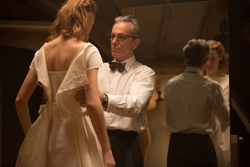This past Monday I had the pleasure of seeing the film Camp de Thiaroye, the first film in this year’s Provost Film Series. It was hosted by Dr. Thomas S. Pearson, Provost and Vice President for Academic Affairs.
“I believe these films will give us a much deeper appreciation of not only the configuration of Africa and the different states and the different factions, but also we will come to appreciate the traditions and the communal practices and emphases of various African cultures,” said Pearson.
This year’s film series, titled African Journeys: Haunting Legacies, Fragile Futures, is about the tribulations faced by African peoples from Algeria to Rwanda. “We’re doing a lot of initiatives with diversity… as an area, many Americans need to know more [about Africa]. Many people have little exposure to films by Africans about life events there,” said Pearson. He also noted that this series is part of the cultural series of events occurring across campus, including lectures and performing arts series installments centered on African culture.
This is indeed a deep film. This semi-autobiographic film focused on a squad of West African soldiers who fought for the French during World War II. They come back from their tour of duty as heroes but, while waiting to be shipped home, they are first held at a French prison camp. They came out of an international war only to fight a personal one.
Director Ousmane Sembene starts the film off with a celebration, and for pretty much the rest of the film, that’s the happiest the audience will see the soldiers. It is a study in the prejudice black soldiers face even when they risk their lives to save others. The camp is located in the desert. It’s a very barren, dry, and lonely looking place. They have no one to turn to except each other.
Sembene creates a sense of dread by showing the base when the soldiers arrive there. Almost all the soldiers are happy to just be safe and in one piece, but all that’s on Private Pays mind is the barbed wire surrounding the base and the guard towers that bring up the disturbing memories of the concentration camp he was held in as well as the fellow soldiers that were killed.
The relationship between the French commanding officers of the camp and the black soldiers is problematic from the start. The commanding officers don’t think very highly of the soldiers, even wondering why they have American uniforms on. The food is terrible and when the soldiers complain about it, instead of being accommodated, they have to go out and find meat themselves.
The soldiers have only one white commanding officer on their side, Captain Reynolds, who can’t really do much to help them even though he knows they deserve better. The soldiers try their best to ignore what comes their way but when one of their own, Sergeant Major Diatta, is beaten up in town by military police and thrown in jail for not having his military ID, they begin to take matters into their own hands.
Diatta gets treated the worst, yet he is the most educated and optimistic of the squad. He earns our sympathy not just due to his leadership qualities and the abuse that he encounters from the French, but also the fact that he is the black sheep of his family. His parents were killed in the war by the same type of people Diatta is fighting alongside of, yet he refuses to renounce his African citizenship. He is married to a white French woman with a son, he speaks French fluently, and studies law. Education is usually a sign of respect, but due to racism between blacks and whites, not only are the white soldiers shunning him, his family is too.
The film is more of a documentary than narrative. It’s in French and African languages but does contain subtitles which aren’t hard to follow. The acting is very good. Even though all the actors do not speak English, their facial expressions and tone tell us all we need to know about what they are feeling.
The pacing is not one of the film’s strengths, but the subject matter is. The movie is a little too long at two hours and twenty seven minutes. Conflicts are few and far between but when they do come they feel real and glue your eyes to the screen. The actors have great chemistry with each other. There is a sense of companionship throughout the film.
The French soldiers, technically the real villains of the film, are given some depth. Reynolds not only respects but is a friend to Diatta and urges him to get the other soldiers to back down for their own safety. Even some of the camp guards who treat the soldiers with disdain know what will happen if the soldiers don’t back down and their faces show they do not like what could happen next.
Despite the subject matter, it was not very graphic. There were scenes of blood here and there but from what I saw, I wouldn’t call it a gory movie. People ages 15 and above could watch this in school.
Retired physical education teacher Don Mayer of Asbury Park New Jersey says, “I was very interested in it and I thought it was very informative and well done.”
Some movies don’t have to be enjoyable. This is one of them. If it was, then it wouldn’t have the same emotional impact.
To close out the night’s movie, Christopher DeRosa, associate professor of history and anthropology, gave us his two cents on the film and insight into why it was semi biographical. “It’s definitely on my list of World War Two films to recommend,” he said enthusiastically. DeRosa found it interesting “that these soldiers were fighting for a society in which they were subjects rather than citizens,” and they were willing to fight and revolt. The history lesson added to the experience.
I recommend this movie to anyone with even a slight interest in history, war film buffs, and high school and college students. It excellently conveys what West African soldiers went through and, although it isn’t exactly a “war” film, it does show that sometimes the war doesn’t end when you leave the battlefield.



